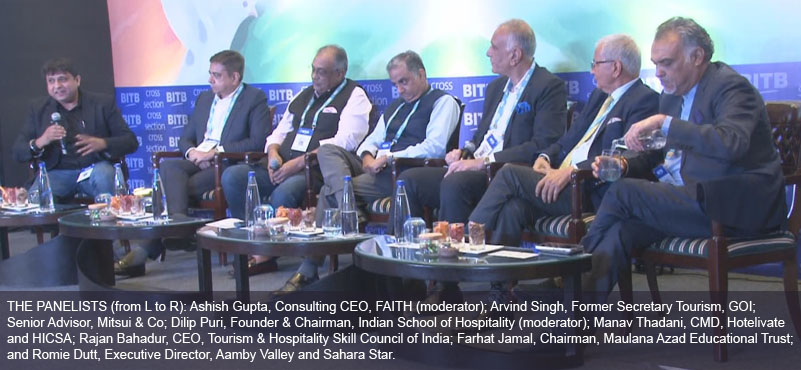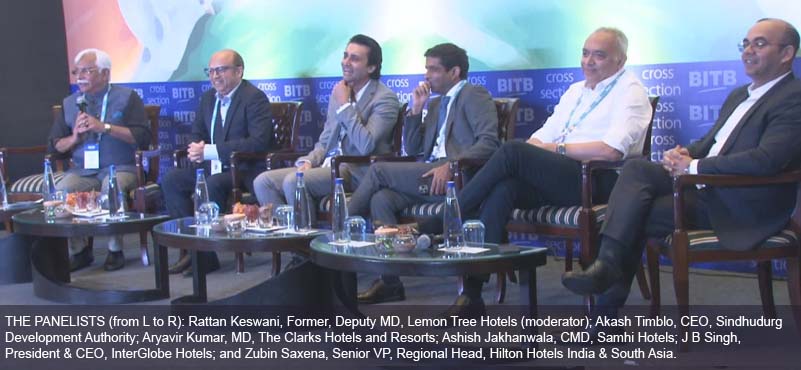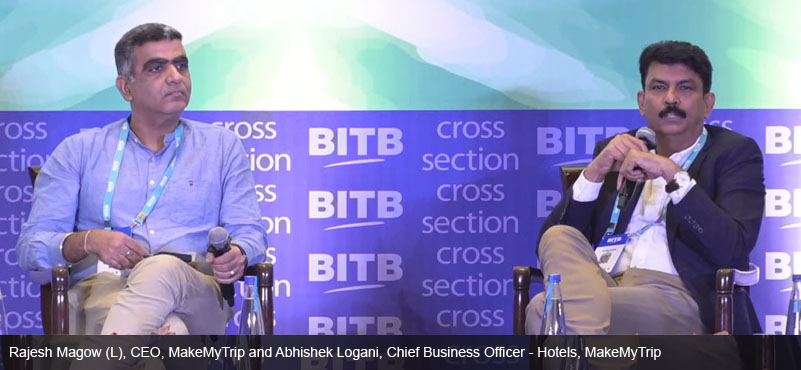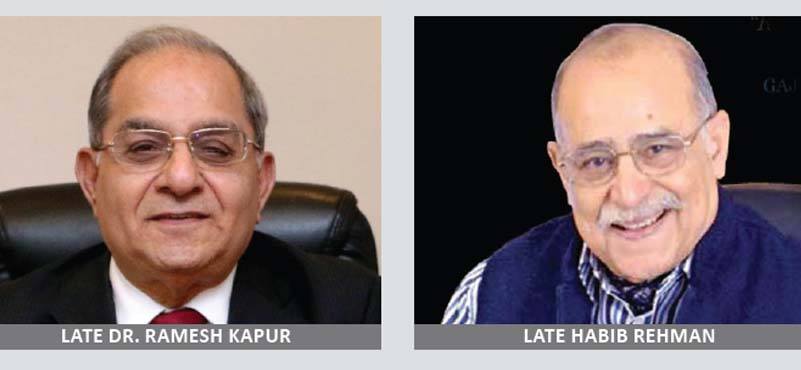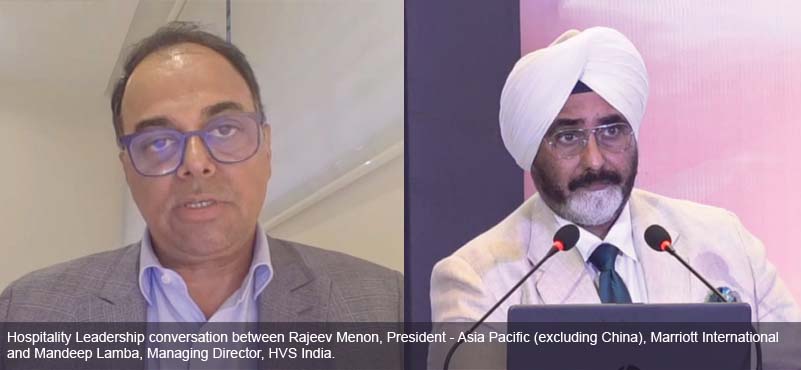Do we need a new story around our industry to attract talent? Are we paying too little for too much work? Does the curriculum need to be refreshed, keeping in mind the challenge in student expectations?
Ashish Gupta: There are some key issues, but all are people related issues. And and I think what’s critical is that how is it that we as an industry are going about addressing that, is the crux of what we will discuss. We will start off with a very crucial issue of skilling. Is it a quality issue? Is it a quantity issue? Or is it a structural issue? And no better than Dilip, again, the co-moderator of the panel, to lay the groundwork for that. Dilip, please, can we have your thoughts on that?
Dilip Puri: In the interest of time, I’ll straight away talk about what’s been on my mind forever, ever since I became an educator. And in fact topical, Arvind Singh ji you are here, as a former Secretary of Tourism as well. So, I’m looking at our IHM system. Today in our country, we have about 80-90 odd institutions which are under the NHMCT. 25-odd are central government IHMs, 25-odd are state and the rest are private. These are meant to churn out roughly 15,000 graduates so that many seats exist within these institutions. In a pre-COVID time, approximately 30-35,000 people applied and sat for a common exam and roughly 18-19,000 got in, so all college seats got filled. In a post-COVID environment and this year’s most recent stats, that number of 30,000 sitting, I am told is down to about 8-9,000 people sitting for the exam, which means almost everybody is guaranteed a seat and yet there’ll be half the seats vacant still.
What is this due to? Some of the factors Ashish articulated, how our industry is perceived in the post-Covid environment, all of those things. But I think we have to fundamentally go back a bit and say, why did the government in the first place in the 50s even establish the IHM system. It seems to me we are the only industry which has a dedicated higher education system. You don’t see an institute of retail management or real estate management or telecom management but there’s hotel management. And I think back to other institutions established around the same time, think IITs, think of the big great IIM business schools. And today, I think what needs to be done and what the crux is, is that we’re going to look at these institutions in their entirety, pick out in my view, the top 10 or 15 of them, the absolutely top institutions which can truly become schools of reference, institutions of eminence, whatever it is, with about 150 to 200 seats, that you are putting into the system every year, to enter at management levels within our industry, circa therefore about 2000 to 2.500 each year entering the high quality space because of high quality of education, great faculty, all the things which institutions of eminence are known for. All the rest, in my view, should be focused on being centers of skilling.
Today, when I look at the amazing work which Rajan does in terms of skilling in the tourism space. If they had access to these 50 odd centres with infrastructure capability, our industry needs blue collar and white collar. I think with the needs of the industry and the growth that all of you are projecting, you see numbers coming out every day, hundreds and thousands of rooms and hotels being signed, and is this crisis? If you are entering two to two and a half thousand young graduates to begin as a management career, and you are also skilling another 20, 25, 30,000 people to enter at associate levels, those skilling institutes need to be working, like for instance Australia, which is a great example. You would remember the TAFE system, tertiary and further education.
So you come in after high school, do a year of education, get a certificate, go and work. Come back after some work, do a second year and get an associate degree, go back and work. Come back, do your third year, get a full-fledged degree. So, it’s not that you’re being denied education and a degree. But these are people who, by their potential, talent, capabilities, there are, you know, India is a huge country. They need to be educated from that perspective and not to say they can’t go on to become very good leaders in the future as well. But I think if we separate this, make our IHMs true institutions of eminence where it’s a, can I get into an IIT? It should be like that, get into these top 10 or 15 IHMs. And all the others who have the infrastructure, use them to skill those hundreds of thousands of workers we need in the years to come. So that’s my hypothesis.
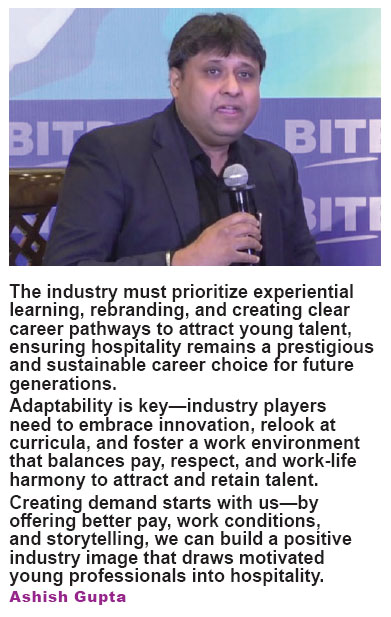 Ashish Gupta: I would request Mr. Singh to first share an example of how could he motivate people, that too in a government set up, to deliver excellence and to what Dilip has said, can there be a structural change to meet the enormous tourism challenge. They say it’s the century of India, unlike what Mr Trump said yesterday,
Ashish Gupta: I would request Mr. Singh to first share an example of how could he motivate people, that too in a government set up, to deliver excellence and to what Dilip has said, can there be a structural change to meet the enormous tourism challenge. They say it’s the century of India, unlike what Mr Trump said yesterday,
Arvind Singh: So, the question that Mr. Puri asked about the infrastructure and using it properly. When I was going through my notes or whatever for the panel, one thing that strikes me is we need much more infrastructure, given the growth that we are going to expect and the boom that we are seeing in the sector post COVID. So, in the organized sector itself, we will need a large amount of manpower. And definitely, and I agree with you that at the national level, the IHMs, especially a few of them, are doing exceedingly well. They are absolutely centers of excellence. The one in, you know, say Mumbai, Bangalore, Goa. Pusa. Pusa is of course right at the top. So, there are a lot of them who are doing very well. And I think what it calls for is greater interaction with the industry as to discuss as to why this perception is happening that fewer people are now appearing for the exam, especially in the post-COVID scenario. Because in one situation, we have a growing young population, people who are looking for jobs. And that’s when I go to economics related seminars, everyone is talking about the demographic dividend and the fact that we have a large pool of people wanting to get into the labour force. On the other side, on the demand side, what we see, is that there is a large number of hotels which are coming up, new construction is happening. But then why this mismatch? So, I think some serious working has to be done from both sides.
You gave the example of IITs, there are always people because they are sure of placements and they’re sure of very excellent placements. We have examples who go to the US and they land up with very good assignments. Most become bankers. Yeah, after doing management, quite a few become bankers also and because you know they see the prospects good there which is what I saw also with some of the IHM graduates when I used to interact with them at the hotels. Some of them wanted to join merchant shipping, some of them wanted to switch to retail, you know the boom in the retail sector that is happening. So, these are new avenues that are coming, obviously they see better salaries or better prospects there. Some of them, I met a graduate at one of the top hotels who wanted to go to merchant shipping. So, I think some hard thinking is needed on this as to why in spite of the fact that we are seeing a boom and in spite of the fact that there is a large pool of young people who are willing and looking for jobs, we are not, trying to get people, we need to find that out.
Skilling, definitely, needs a large amount of infrastructure and attention because majority of the jobs in the hospitality sector are in the organised sector. There’s definitely a large need for people to be in good quality hotels and good quality personnel in white collar jobs. But you will need a large number of people at the lower end of the spectrum also.
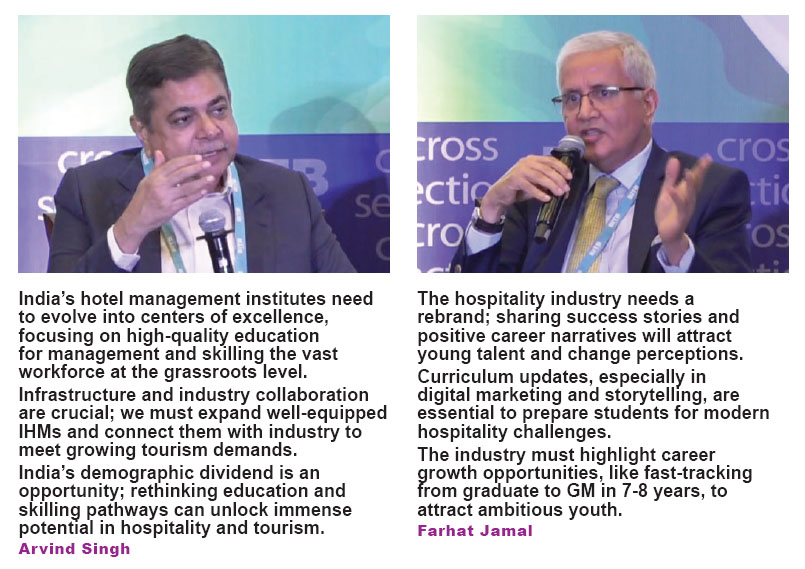
And definitely the work that Rajan Bahadur and his people are doing, that needs to go out at a greater speed. I would say that the industry needs to look at the state institutes of hotel management. Many states are not able to manage and know, manage and run them on their own. They don’t have the budgets. And during my stint in the ministry, we found a very good arrangement in Nagaland where a private entity has come up. It has combined forces with the state government and it is running the state institute at Dimapur, which is doing very well and now graduates from that institute are able to find placements in good hotels. Similar experiments can be done with other states because I was told that some other states were also looking for partnerships because of their issues of management, issues of finding the right budget to run the institutions. I think the state institutes are definitely a good target institution that you can look at to work, raise their levels and find a good niche point for people to enter and to enter the industry.
Ashish Gupta: Manav, you know there is this dialogue in Sholay and we all know how many people were there, which Gabbar asked before he shot everyone out. I will ask Manav that actually Manav, how many people are there? You make such a good forecast, which runs the whole hotel industry. There are so many hotels which are coming up in the pipeline, thanks to your team.
Manav Thadani: I’ve stopped looking at tracking at what hotels are announcing because today if you don’t announce a hundred hotels no one even opens the paper to lift it up. And there are some friends out here who made those announcements. So first of all, if all those hotels were actually to be built, then we will only have hotel industry running the country. So first of all, those numbers need to be thrown out. Because I think, I don’t know if their bonuses or the development guys’ bonuses are linked to the number of announcements. So that’s the first problem. But I think, there are too many experts here to talk about what can be done at the skilling level or the school level and I’m sure they’ll do a great job and they’ll upgrade the program and so forth.
I think for me the problem lies somewhere else as well. I don’t know but there are enough white-haired great people who have been working in the industry for 30 years out here. If you look at what we were paying our entry level people back then, and what we were paying GMs 30 years ago, and you look at what GMs are making today, and what those people at the entry level are making today, that gap may have been a 15 or 20x back then, today it’s a 100x. So, salaries for the entry level people have grown below inflation, much below inflation. Whereas salaries for the GMs, the senior level people, who can fight for themselves, have grown tremendously.
So, the basic problem lies is that we’re not paying enough. You’re making them work on the weekends. They’re putting in 60-70 hours. You want to pay them 10,000-15,000 rupees. If they’re doing an intern, which is when you’re trying to attract them to your industry, sometimes they’re given free food and drink for three months. And I’m talking about international brands. So, if there’s a Marriott, Hilton, Hyatt, whoever is sitting out here, I know that sometimes you’re paying them peanuts. And that’s the time you’re trying to attract them. So basically, the problem starts with there. You know, why aren’t we looking at a five-day week? Why aren’t we being innovative about it? At the corporate level, we want to be innovative. All of us who are in corporate, we want to have a five-day week or a five-and-a-half-day week. Yes, hotel industry people don’t sleep. I say I’m working 24 by 7. But those guys are putting in 12 hours, maybe more. How are you going to attract people?
The second problem is we haven’t changed the way hotels are built. Hotel restaurants don’t do well. Why do we need four restaurants? Why do we need three restaurants? Why do we need to overstaff? I think AI is going to come and start solving some of that problem, but we also need to start constructing hotels which require lesser manpower. And I think those are the two areas that I would suggest, which I don’t have control over, the government doesn’t have control over, we as people who are building hotels need to be smart about it. And yes, we as corporate heads need to be smart about how do we attract better talent?
Ashish Gupta: We’ll just shift the focus. Farhat, long time back, ITC as a company, not hotel company, but as a group had a philosophy that if you enter our company, and then if you exit, it’s not your fault, it’s our fault, because we have done something wrong, because if we recruited you, you were obviously very good because we recruited you. Farhat, Taj is always the brand standard. Do you feel, and you had people coming in from your institute versus outside, do you feel, to the point that Dilip said, should hotels have their own recruitment system or should they work with centres of excellence or should there be a mix? What do you feel is the quality of skilling? We’ve touched a bit about quantity, quality of skilling between this insourcing versus outsourcing?

Farhat Jamal: I think the industry itself needs to rebrand itself as far as employment is concerned. Some parts may be true, because I think of the times when I joined the industry, or many of us on the stage, and many in the audience, when they joined, those were very different times and we survived through them. I think the times have changed today. If you rebrand the industry and tell some positive stories about the industry – the industry lacks positive stories, lacks people sharing some good career paths, lacks people who have done well in the industry. We have no broadcasting mechanisms for this. So, what happens is parental pressure, societal pressure, everyone saying, you have to work 16 hours a day. That’s not the truth anymore, especially in the branded hotels, I can say that. I am not so sure in the unorganised sector. But there is a challenge.
But the fact remains today, I think things have gone a little better. Of course, lots have to be done. The curriculum is exactly the same today. Curriculum has not changed in the hotel schools. The change in curriculum has to happen drastically because today you take simple things like digital marketing. I don’t know how many hotel schools have serious digital marketing inputs being given. Somebody who can write culinary stories, somebody who is a great storyteller for the business itself.
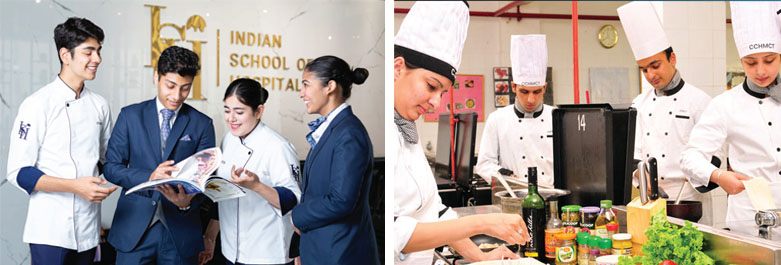
There is no such program in any of the IHMs that I know of. We are trying to incorporate them in one of the IHMs that I am part of – in Aurangabad, and of course Dilip runs the ISH, he does a great job there. What I am trying to say is that there also a perception which is, I won’t call it purely negative, but I think does not give a very encouraging picture about the industry.
I had the graduation ceremony recently and I was talking to the kids who were passing out and I said how many of you are joining the industry. I was shocked to see that out of a batch of 100, only 20 are joining the industry. And I asked them why they’re not joining the industry. Some of course were coming from backgrounds of families who’ve got their own businesses running, they’re joining their own businesses, but there are others who are doing higher education, etc. But there are quite a few who said this is not the industry that they want to join, they want to be in the digital market. So, the industry itself can create lot of new jobs from digital space to many other things that are actually not in the curriculum and the demand is dwindling now at the hotel schools. That’s so critical.
Ashish Gupta: I see the defense services branding themselves every day to motivating people to come and join the defense. It’s phenomenal. And this is a job which is a job which hazards your life. And yet they get motivated. So why should not the Indian tourism or the hospitality industry also do that?
Dilip Puri: That’s not true actually. The armed forces are forced to advertise today as much as hotels are being forced to advertise because the quality of people who joined the defence forces 20-30 years ago, it’s changed significantly. So that advertising for the armed forces is not out of any patriotism, let me tell you that.
Arvind Singh: This is something that I have also experienced – people coming out of hotel schools and not wanting to join the industry. During my stint as Secretary of Tourism, I went to the Middle East and I stayed in a very good hotel. And the entire staff, almost all of them were from India. And in the Middle East, you will find them. I talked to some of them. There was a boy from Uttarakhand, there was somebody from Palampur in Himachal Pradesh, who have left their families back and I asked them, are you happy? I mean, of course, they gave me politically correct answers. But what is it that attracts them to go and work there, leaving their families behind, going to live alone and work there, and they’re not willing to join something in our country itself. So, I think that’s the point to ponder about.
Farhat Jamal: I think the answer to that of course is the compensation that they get there, that the security of the job that they have and they are going there because they are doing an assignment for 5 years and 6 years that they will make their money etc and they come back here.
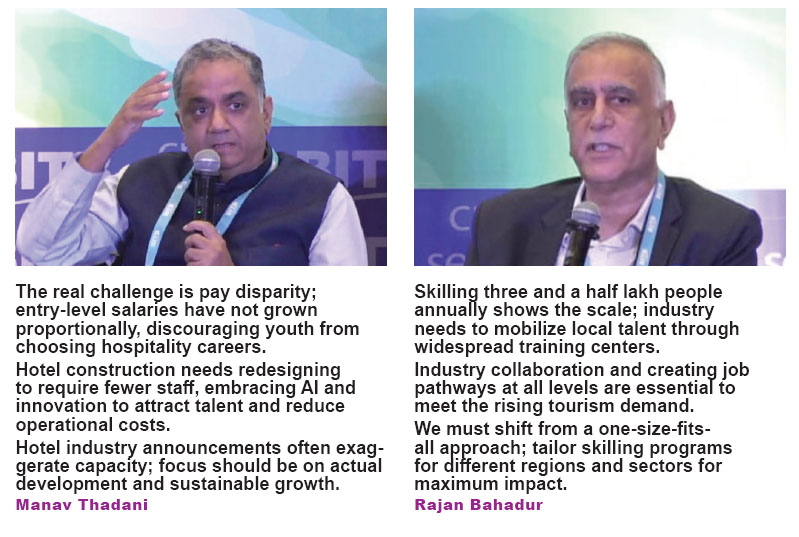
I don’t want to talk about only IHCL, because I belonged to that company at one point, I was at the ABC conference in Goa and I was quite pleased to hear that they are actually hiring young graduates and fast tracking careers – in 7-8 years, you can become a general manager. In 7-8 years time, if you are smart enough, you can become a GM, which was very encouraging, which could not happen in the wildest of dreams in the past. It was a criterion of the old school, unless you have 30 years experience, 20 years experience you can’t become a GM.
Manav Thadani: I don’t know if it’s happening by design or it is because there’s no one there. They have to promote people.
Farhat Jamal: No, no, it’s by design.
Ashish Gupta: So that’s a very interesting point. If you can show visibility of where do you move and as to Manav rightly said, is it by design or by default? I’m assuming it’s a mix of both.
Do you see brand standards being diluted by all the issues that have come out in terms of the quantity of skilling. Do you think that’s something for the industry to be worried about?
Romie Dutt: Well, you’re right in a way. Yes, the manpower is a very, very critical issue. All of us have very nicely articulated it. I could hear Roseate do a great job trying to upskill their people. The industry is purely driven by humans as somebody else had said, and it’s serving humans. Whatever else technological advances and other things we do, we cannot take away the heart of the business which is the emotional quotient about the industry. So, the people become very important in this, skilling them becomes very important. What Mr. Puri said about IHMs, having 10 or 15 of them, as excellence centres, where they could churn out the future people for the industry.
I’m sure all of us must have been hotel management graduates. I also passed in 1990 from Pusa. While running Aamby Valley and Sahara Star, not for long as you guys have been, for the last about six years, I somehow realized, because one of the businesses I run, it’s in a remote, little remote area, not exactly remote, but we have the challenges of not having a city where people can actually live a full life. So, the attrition for us in Aamby Valley is very high.
And so I realized that the quality of people we get, the service standards which we’ve been always thinking about, is being seriously challenged. It’s true that the leaders are not being created, not by design alone, but also by compulsion. Because I have never seen lobby managers, duty managers, F&B managers at a young age, they are today. So there is, there could be a reason, both on the design as well as the need sector. Now, my only thing with IHMs is, which I’m sure Mr. Puri in his great school has tried to modulate in a way which is more akin to industry needs.
We started, we have just started an academy called the A-Star Academy, where what he are saying is that people need to live the industry from day one. Unfortunately, with IHMs, the first year when they are there, they do not know the industry. They are just into classrooms, getting taught into different segments of the industry. It’s more of a college; it’s more of an institution. You are just there going to colleges, going to canteens, having fun till the time you go into the next year.
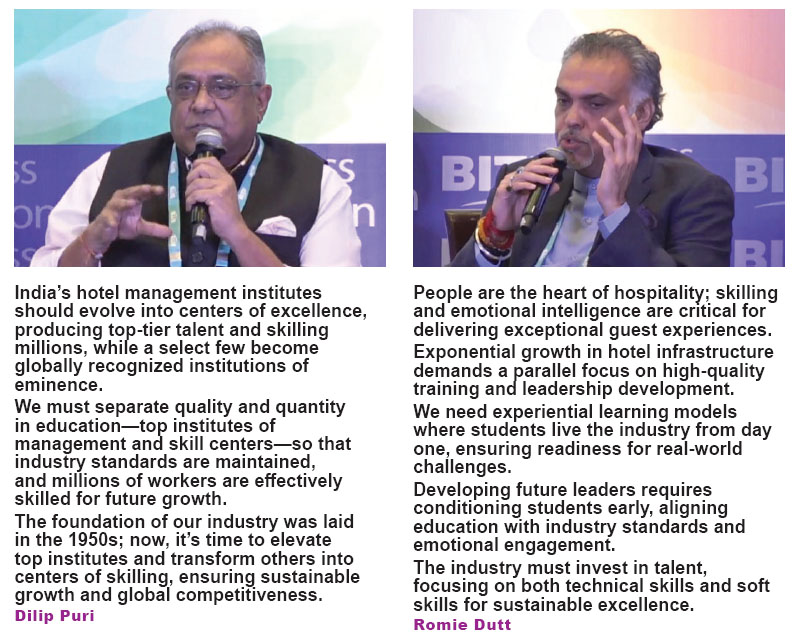
And when you go into the next year and the first six months, if you are there in the first batch and you are made to start peeling potatoes and bus trays and do everything, a lot of things change in your mind. And what happens by the end of the third year, they realize that there are so many other things they can do which can make them more money, give them a better career than going into the industry.
We are a very disciplined industry, right? We work very long hours, we have no choices, whatever is told to us to do for the 9, 10, 11 hours, we have to do it diligently and most importantly smilingly, we can’t argue, we can’t react. So basically, what we are doing is, you are changing the complete genetic makeup of the person to say that you keep smiling, the guest is always right, whatever he says you accept, be humble, be gentle. So basically, it is a conditioning of the mind.
But in the colleges, it is not taught like that. In colleges, there is a curriculum-based degree program. So, what we started is, we said that if we start a college for the industry, which is a three-year degree program, but from the day one, the children of the program get exposed to the hotel every day. So, we have started this just recently, and we have made a program which is completely for the hotel. See the IHMs, the curriculum, the pedagogy, everything is being done for years back.
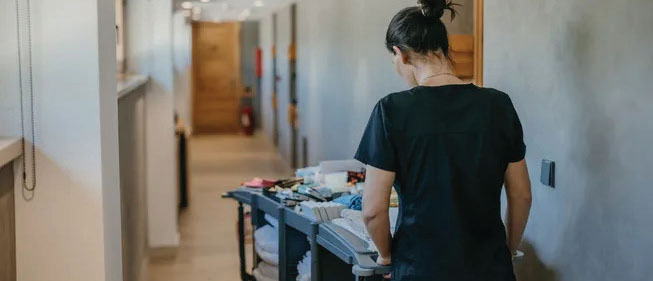
So, what we’ve done is we’ve used a basic frame of a curriculum, we have changed it completely to suit the industry. So apart from the teachers of the academy, we have started something called as professors of practice. In that, all my chefs, we have chosen the chefs, the front office, the F&B service, the housekeeping, the engineering, every one of them is also a teacher and a mentor to the students. You ask any NDA graduate after three years, he is ready to die for the country. It is because he’s been conditioned like that. So, in our college, we are trying to condition our boys and girls to live the industry every day, to breathe it, to eat it and then they decide whether they want to be a part of it or not want to be a part of it. So, after three years, once these guys graduate in any IHM, they will be standing apart because they would have, so we have a log book, they have to mandatorily do one hour for the first six months, two hours for the next six months. So it’s like every day they have to go and work in a particular department specifically what they have been taught in the day they go and see the practical in the evening.
So, what is happening is you are creating a manpower which could be the future leaders or managers who have lived through their three years of curriculum living in two different hotels. So, one we have a residential school in Aamby Valley which also gives you a huge exposure in terms of event management, weddings, because we do very large -scale events.
Ashish Gupta: This is a very interesting model. People of the industry, for the industry, by the industry. I think it’s fantastic. Let’s come to the man of the hour, Rajan, whom everybody keeps on referring to in every forum. I think Rajan and his team are creating that skilling in the country which is so critical. Tell us Rajan quickly, the whole ecosystem which is coming from below, if that doesn’t get met, we are in a huge state of crisis but you are meeting that at a national level. Tell us your experience and how strategic is it ?
Rajan Bahadur: So, couple of things, firstly I completely agree with Dilip what he said, you got to see it in two buckets, one is the white collar, the management trainees and so on and so forth. He also spoke about the fact that IHMs and all where the central, state privately run about 30-35,000 seats per annum, 50% are getting filled. The flip side is that at THSC, we skill and upscale three and a half lakh people every year. I’m saying that there is scope. And when we work at the middle and the bottom of the pyramid. Sometime back, I got invited by the current Secretary Tourism, where we addressed about 25 of the IHMs and we spoke about what we are doing. The biggest issue at IHM currently is that they don’t have the capability of going out and mobilising people. People are not coming to IHM’s. We follow a hub and spoke method where we are going, we run about over 10,000 training centres today which are in B category, C category cities and towns. Where we mobilise these kids locally, we train them on short term training 3 months, 6 months and then make sure that they’re placed. We place about 80% of them, then they’re dropouts. And so the point is very, very clear that you got to look at it differently. You can’t paint everything with the same brush.
I’ll switch on to what a bit of what Manav said. We keep talking about the fact that not a nice place to work or there are challenges. Everything is fine. Salary, working hours, everything we need to look at it. But who’s going to get up and sell the business? Nobody from outside is going to do it. What are we comparing ourselves to? Let’s compare ourselves to, let’s say, joining at the bottom of the ladder at say Hindustan Levers, who’s doing 25 days in a month rural marketing.
Let’s compare ourselves to somebody in the Tata Steel who’s at the shop floor. You think that’s very nice? Let’s talk about, we spoke about defense. At least we are in a very controlled environment. We are in an environment where you’re back of the house or front of the house, you’ve got cross-cultural team, great exposure. You got, you are dealing with guests who are from different nationalities, huge exposure.
So, I think lots is happening. If I may put it bluntly, enough of us cribbing about these things, we got to go get up and smell the coffee ourselves. That’s so phenomenal.
Dilip Puri: I think I have a solution perhaps for the industry at least. This whole perception when you say graduates from IHMs, you give the example that they want to go and work in other industries or in digital and all of those stuff. Our students are like that too. You gave a very good example of how Unilever trains or any of these multinational companies, do. They take management trainees also; they take them from the big business schools. In the two years that they spend in their management training, none of them are taken in, saying you’re taken for sales or you’re taken for operations, you’re taken for revenue, you’re taken for HR.
You get into the Unilever management training program, over two years you are trained to be a generalist. Look at our industry, we are making it worse for ourselves. We continue to say, we want management trainee housekeeping, we want management trainee revenue, we want management trainee sales, we want management trainee operations. In some ways you are almost putting the stigma on that kid.
Every company in doing any program like this, you must take them in to become generalists. After they finish that two years, they must do a stint in operations, so they’re doing the grind. They must do a stint in marketing and sales and in HR and all those functions. I tell you in five years time, they are absolutely ready to at least start that leadership journey towards becoming general managers. They’ll be more retentive to you because you suddenly opened up the canvas of possibilities. You can’t just stereotype that young person you’re taking in and I think that’s a pretty easy fix for companies to do.
At ISH, we train management trainees for at least three of the big brands in India and for the last three years we’ve been working together to say the programs must become generalized in a way in which these young people see their careers across all functions of a hotel because they want to go to digital marketing. Of course they’ll get a stint there, they have to do operations. I think if we start aligning how we take them and train them in our industry, we’ll attract more of them from the institutions and hopefully the institutions will attract more of them from schools. I think therein lies one of the solutions.
Ashish Gupta: Mr. Singh, I read Mr. Amitabh Kant recently said that, he was quoting, he said universities must become, must train people today to become innovative all their life. Do you think that model is applicable to the whole framework of hotel management?
Arvind Singh: Definitely, because as pointed out by Mr. Jamal, the curriculum needs to have a relook. The industry is evolving, there is a lot of change, new challenges, other options are opening up. That’s where, when I spoke to my colleagues in the ministry, they say that we are working on, a task force has been set up, Mr. Kachru is there and, we want to kind of rework things so that there can be, but I think it’s the need and definitely it has to be done. Otherwise, this kind of complaining will keep going on.
Because here we have good infrastructure, we have the demand and we have a large pool of people who are looking for good talent so I think we have to marry all these forces together and come up with a solution that is sustainable for all and the results in win-win situations for all and I’m sure it can happen because I have seen that example like the Nagaland example I gave of a state institute which has turned around and is delivering excellent graduates who are coming and finding jobs with the leading places so if it can happen in a state like Nagaland with the state Institute I’m sure it can be done with very lots of national institutes as well as state level institutes in the private sector.
Ashish Gupta: Manav, we see this news every day of different industries where, which says that entry level jobs are going to go away, 60 to 70% and maybe not hospitality, but do you see this trend coming to hospitality as well? I was reading this report yesterday, which said that jobs most at risk are travel and hospitality from AI at entry level. Do you agree as a trend forecaster?
Manav Thadani: I think in 20 years’ time, you’ll have robots taking care of housekeeping, serving in restaurants, you’ll see a lot of that, but I think human intervention will always be required and cannot disappear. I agree with Mr. Jamal that we need better storytellers, we need to pay better and we need better storytellers, but yes to answer your question I do see that change and the need of ratio of employees rooms will continue to go down.

Navin Berry: I don’t know about the other IHM. My exposure to IHM PUSA left me very, very disheartened. It’s falling apart. It’s literally falling apart. I wanted to go to the washroom. Can I say I couldn’t use the washroom. IHM Pusa, I couldn’t use the washroom. Now if that is the kind of institute which is turning out children of excellence, I have my grave doubts. And I think if anybody wants to aspire to a good career, and you say, this is premier institute, he is going to go there and not come back. There are modern schools. I mean, today’s institutes are even as buildings are world class. And this thing is falling apart.
And I asked the principal very nicely, I said, I am sorry, I am not being rude to you, but you need to do something, you need an IHM 2.0 or maybe 5.0 now, you need a quantum jump. So somewhere, Mr. Arvind Singh, you still have a lot of clout in the government. I would see IHM actually being privatized. My personal belief is government should not be in the business of running institutes.

Dilip Puri: Now I mean they should have the autonomy like IIT, IIMs all of them have. I still think the government needs to have a role in it but grant them the autonomy, give them whatever subsidies and all are needed. But as you rightly said, the infrastructure for some of them should be in lines with what global quality is.
Farhat Jamal: I just want to add on this hotel management space. Out of my experience in the past few years, the demand for culinary programs has gone exponentially high. They are all oversubscribed actually. Today’s youth actually they are very keen to all become chefs, patissiers, open their own bakeries, open their own online stores, etc. They are very excited and I think we are actually not even meeting the requirement of those slots that are available.
Dilip Puri: One caveat Farhat, the culinary demand is increasing with young people to study but they don’t want to be chefs in hotels.
Farhat Jamal: I didn’t mention hotels that’s why. I think that’s another problem for us. I did not mention hotels because they all want to become entrepreneurs. But the fact is they will at least come to the colleges if you have fantastic culinary programs. If you teach them world class culinary program, they will come to you. And over and above that, if somebody wants to become a revenue management specialist, they will come out of this college.
Because the finance piece in IHM programs is very little. I think that is something that has to be really increased. Today, if you give a guy in IHM, can you do a feasibility study, give a report, I am just giving an example. They should be able to do some basic stuff, basic.
Ashish Gupta: What is it that we should do as an industry just one line, to address this issue.
Romie Dutt: Experiential learning.
Farhat Jamal: Rebrand and share success stories.
Rajan Bahadur: I said it earlier, wake up and smell the business. Nobody from outside is going to come into it.
Manav Thadani: Pay more at the bottom of the pyramid.
Dilip Puri: Totally back him. Pay more, work them less.
Arvind Singh: Adapt to the rapid changes happening around you.
Ashish Gupta: Adapt, ladies and gentlemen. It’s the power has to be in our hands. We have to ensure that we create the demand for people to join industry. We’re creating a work-life balance, which they want, giving them the opportunities that they want, giving them the pay structure they want, and giving them the respectability that they want.

